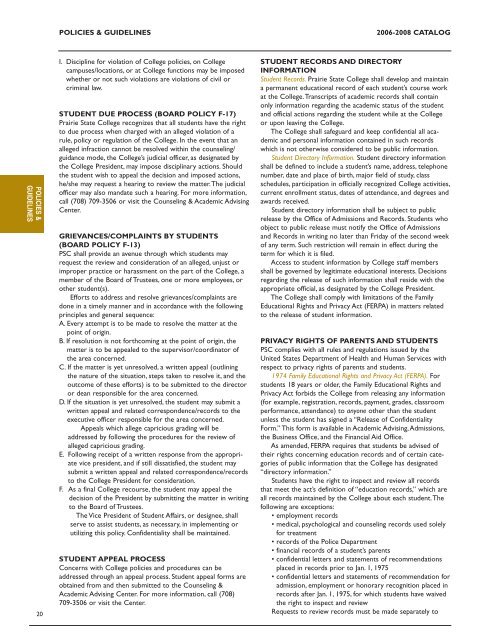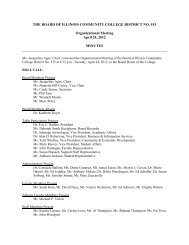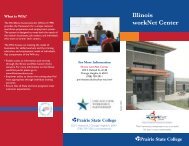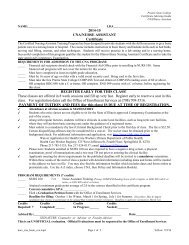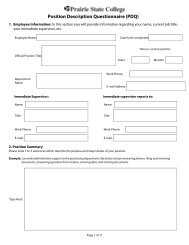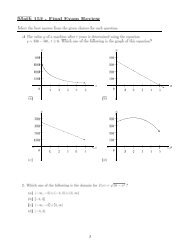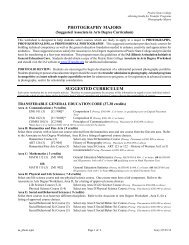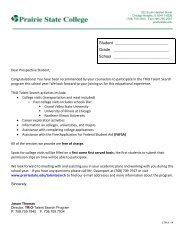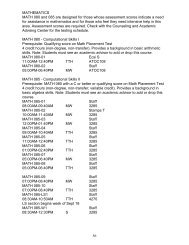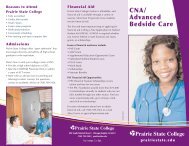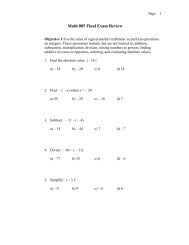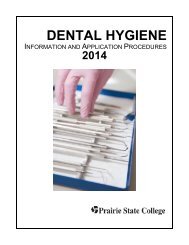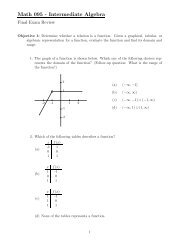POLICIES & GUIDELINES2006-2008 CATALOGPOLICIES &GUIDELINES20I. Discipline for violation of <strong>College</strong> policies, on <strong>College</strong>campuses/locations, or at <strong>College</strong> functions may be imposedwhether or not such violations are violations of civil orcriminal law.STUDENT DUE PROCESS (BOARD POLICY F-17)<strong>Prairie</strong> <strong>State</strong> <strong>College</strong> recognizes that all students have the rightto due process when charged with an alleged violation of arule, policy or regulation of the <strong>College</strong>. In the event that analleged infraction cannot be resolved within the counseling/guidance mode, the <strong>College</strong>’s judicial officer, as designated bythe <strong>College</strong> President, may impose disciplinary actions. Shouldthe student wish to appeal the decision and imposed actions,he/she may request a hearing to review the matter.The judicialofficer may also mandate such a hearing. For more information,call (708) 709-3506 or visit the Counseling & Academic AdvisingCenter.GRIEVANCES/COMPLAINTS BY STUDENTS(BOARD POLICY F-13)PSC shall provide an avenue through which students mayrequest the review and consideration of an alleged, unjust orimproper practice or harassment on the part of the <strong>College</strong>, amember of the Board of Trustees, one or more employees, orother student(s).Efforts to address and resolve grievances/complaints aredone in a timely manner and in accordance with the followingprinciples and general sequence:A. Every attempt is to be made to resolve the matter at thepoint of origin.B. If resolution is not forthcoming at the point of origin, thematter is to be appealed to the supervisor/coordinator ofthe area concerned.C. If the matter is yet unresolved, a written appeal (outliningthe nature of the situation, steps taken to resolve it, and theoutcome of these efforts) is to be submitted to the directoror dean responsible for the area concerned.D. If the situation is yet unresolved, the student may submit awritten appeal and related correspondence/records to theexecutive officer responsible for the area concerned.Appeals which allege capricious grading will beaddressed by following the procedures for the review ofalleged capricious grading.E. Following receipt of a written response from the appropriatevice president, and if still dissatisfied, the student maysubmit a written appeal and related correspondence/recordsto the <strong>College</strong> President for consideration.F. As a final <strong>College</strong> recourse, the student may appeal thedecision of the President by submitting the matter in writingto the Board of Trustees.The Vice President of Student Affairs, or designee, shallserve to assist students, as necessary, in implementing orutilizing this policy. Confidentiality shall be maintained.STUDENT APPEAL PROCESSConcerns with <strong>College</strong> policies and procedures can beaddressed through an appeal process. Student appeal forms areobtained from and then submitted to the Counseling &Academic Advising Center. For more information, call (708)709-3506 or visit the Center.STUDENT RECORDS AND DIRECTORYINFORMATIONStudent Records. <strong>Prairie</strong> <strong>State</strong> <strong>College</strong> shall develop and maintaina permanent educational record of each student’s course workat the <strong>College</strong>.Transcripts of academic records shall containonly information regarding the academic status of the studentand official actions regarding the student while at the <strong>College</strong>or upon leaving the <strong>College</strong>.The <strong>College</strong> shall safeguard and keep confidential all academicand personal information contained in such recordswhich is not otherwise considered to be public information.Student Directory Information. Student directory informationshall be defined to include a student’s name, address, telephonenumber, date and place of birth, major field of study, classschedules, participation in officially recognized <strong>College</strong> activities,current enrollment status, dates of attendance, and degrees andawards received.Student directory information shall be subject to publicrelease by the Office of Admissions and Records. Students whoobject to public release must notify the Office of Admissionsand Records in writing no later than Friday of the second weekof any term. Such restriction will remain in effect during theterm for which it is filed.Access to student information by <strong>College</strong> staff membersshall be governed by legitimate educational interests. Decisionsregarding the release of such information shall reside with theappropriate official, as designated by the <strong>College</strong> President.The <strong>College</strong> shall comply with limitations of the FamilyEducational Rights and Privacy Act (FERPA) in matters relatedto the release of student information.PRIVACY RIGHTS OF PARENTS AND STUDENTSPSC complies with all rules and regulations issued by theUnited <strong>State</strong>s Department of Health and Human Services withrespect to privacy rights of parents and students.1974 Family Educational Rights and Privacy Act (FERPA). Forstudents 18 years or older, the Family Educational Rights andPrivacy Act forbids the <strong>College</strong> from releasing any information(for example, registration, records, payment, grades, classroomperformance, attendance) to anyone other than the studentunless the student has signed a “Release of ConfidentialityForm.” This form is available in Academic Advising,Admissions,the Business Office, and the Financial Aid Office.As amended, FERPA requires that students be advised oftheir rights concerning education records and of certain categoriesof public information that the <strong>College</strong> has designated“directory information.”Students have the right to inspect and review all recordsthat meet the act’s definition of “education records,” which areall records maintained by the <strong>College</strong> about each student.Thefollowing are exceptions:• employment records• medical, psychological and counseling records used solelyfor treatment• records of the Police Department• financial records of a student’s parents• confidential letters and statements of recommendationsplaced in records prior to Jan. 1, 1975• confidential letters and statements of recommendation foradmission, employment or honorary recognition placed inrecords after Jan. 1, 1975, for which students have waivedthe right to inspect and reviewRequests to review records must be made separately to
2006-2008 CATALOGPOLICIES & GUIDELINESeach office that maintains records. Requests must be made inwriting and presented to the appropriate office.That office willhave up to 45 days to honor requests. For most students theseoffices include the Business Office; Barnes & Noble <strong>College</strong>Bookstore;Admissions, Enrollment & Career DevelopmentServices; Office of Financial Aid & Veterans Affairs; Counseling &Academic Advising Center; Library; Student Success Center; andOffice of Disability Services.Students may challenge any information contained in educationrecords that may be misleading or inappropriate.This rightdoes not extend to reviewing grades unless the grade assignedby an instructor was inaccurately recorded.To challenge informationin a file, students must make a written request for ahearing to the Vice President of Student Affairs.The hearing will be held within a reasonable period of timeafter the administration has received the request.The studentshall be given notice of the day, place and time well in advanceof the hearing.The hearing will be conducted by three staffmembers and two students appointed by the Vice President ofStudent Affairs.A decision of the panel will be final and basedsolely on the evidence presented.If the hearing is not conducted according to the student’sexpectation, he or she may insert a note of exception in therecord.The institution will correct or amend any documentedrecord in accordance with the decision of the hearing panel.Under the act, prior written consent must be obtainedbefore information may be disclosed to third parties unlessthey are exempted from this provision.These exemptionsinclude the following:• requests from the <strong>College</strong> staff with a legitimate educational“need to know”• requests in accordance with a lawful subpoena or courtorder• requests from representatives of agencies or organizationsfrom which students have received financial aid• requests from officials of other educational institutions inwhich students enroll• requests from other persons specifically exempted fromthe prior consent requirement by the act (certain federaland state officials, organizations conducting studies onbehalf of the <strong>College</strong>, accreditary organizations)• requests for directory informationIn accordance with the act, the <strong>College</strong> has designated thefollowing categories of information as public.This informationwill be released to any inquirer with the approval of the Deanof Academic Services & Counseling unless students requestthat all or part of this list be withheld.These categories are thefollowing:• name• city/town of residence• major field of study• participation in officially recognized activities and sports• weight and height of members of athletic teams• dates of attendance (including current classification andyear, matriculation and withdrawal dates)• degrees and awards received (type of degree and dategranted)If students wish to file a request withdrawing some or all ofthe information in the directory classification, they shouldreport to the Admissions Office and complete the necessaryform.After students file this form, the Admissions Office willnotify the appropriate <strong>College</strong> offices and begin to comply assoon as possible.If students have questions regarding the provisions ofFERPA, they may contact the Office of the Dean of AcademicServices & Counseling at (708) 709-3518.RIGHTS AND RESPONSIBILITIES FOR STUDENTSWITH DISABILITIES (BOARD POLICY F-24)<strong>Prairie</strong> <strong>State</strong> <strong>College</strong> shall recognize and comply with theAmericans with Disabilities Act (ADA), PL-10136, and withSection 504 of the Rehabilitation Act, which apply to post-secondaryeducation programs and activities.With regard to recruitment, admission, academic programs,occupational training, counseling, placement, financial aid, physicaleducation, athletics, intercollegiate activities and clubs,<strong>Prairie</strong> <strong>State</strong> <strong>College</strong> shall provide reasonable accommodationto all qualified disabled students to afford them an equal opportunityto participate in those programs or activities for whichthey demonstrate an ability to benefit.A qualified disabled studentis an individual with a disability who meets the academicand technical standards requisite to admission or participationin the <strong>College</strong>’s educational programs or activities.It shall be the responsibility of the student who requiresaccommodations to request such accommodation through the<strong>College</strong>’s designated Coordinator of Disability Services, whocan be reached at (708) 709-3603, or by visiting Room 1200.CLEAN AIR/SMOKE-FREE ENVIRONMENT(BOARD POLICY C-11)<strong>Prairie</strong> <strong>State</strong> <strong>College</strong> shall contribute to a healthy environmentfor its students, employees and the public by fully complyingwith, or exceeding, the Illinois Clean Indoor Air Act of 1990.To eliminate air contamination and the harmful effects andunsanitary conditions caused by smoking and smokeless tobaccoproducts, the <strong>College</strong> shall establish and maintain a “CleanAir/Smoke-Free” environment and shall prohibit the use oftobacco products in its buildings, facilities, selected grounds andvehicles, and in those spaces leased for its use.Persons in violation of this policy shall be subject to theappropriate disciplinary policies relating to employees, studentsand visitors.Primary enforcement shall be the responsibility of theOffice of Campus and Public Safety.Further, the <strong>College</strong> shall offer tobacco-use cessation assistanceto its employees and students through appropriate programsand services.POLICIES &GUIDELINES21
- Page 1 and 2: A comprehensive community college20
- Page 3 and 4: 2006-2008 CATALOGIllinois Community
- Page 5 and 6: 2006-2008 CATALOGCONTENTSOVERVIEW:
- Page 7 and 8: 2006-2008 CATALOGOVERVIEWGETTING AC
- Page 9 and 10: 2006-2008 CATALOGOVERVIEWASSOCIATE
- Page 11 and 12: 2006-2008 CATALOGOVERVIEWIllinois E
- Page 13 and 14: 2006-2008 CATALOGENROLLMENTSTARTING
- Page 15 and 16: 2006-2008 CATALOGENROLLMENT7. Pay t
- Page 17 and 18: 2006-2008 CATALOGENROLLMENTSPECIAL
- Page 19 and 20: 2006-2008 CATALOGPOLICIES & GUIDELI
- Page 21: 2006-2008 CATALOGPOLICIES & GUIDELI
- Page 25 and 26: 2006-2008 CATALOGPOLICIES & GUIDELI
- Page 27 and 28: 2006-2008 CATALOGPOLICIES & GUIDELI
- Page 29 and 30: 2006-2008 CATALOGSTUDENT SERVICESFI
- Page 31 and 32: 2006-2008 CATALOGSTUDENT SERVICESFI
- Page 33 and 34: 2006-2008 CATALOGSTUDENT SERVICESOT
- Page 35 and 36: 2006-2008 CATALOGSTUDENT LIFEEXPERI
- Page 37 and 38: 2006-2008 CATALOGSTUDENT LIFENORTH
- Page 39 and 40: 2006-2008 CATALOGSTUDENT LIFECULTUR
- Page 41 and 42: 2006-2008 CATALOGDEGREES, CERTIFICA
- Page 43 and 44: 2006-2008 CATALOGILLINOIS ARTICULAT
- Page 45 and 46: 2006-2008 CATALOGFine Arts CoursesA
- Page 47 and 48: 2006-2008 CATALOGDEGREES, CERTIFICA
- Page 49 and 50: 2006-2008 CATALOGDEGREES, CERTIFICA
- Page 51 and 52: 2006-2008 CATALOGBUSINESSA.A. Degre
- Page 53 and 54: 2006-2008 CATALOGCOMPUTER SCIENCEA.
- Page 55 and 56: 2006-2008 CATALOGEARTH SCIENCE/GEOL
- Page 57 and 58: 2006-2008 CATALOGDEGREES, CERTIFICA
- Page 59 and 60: 2006-2008 CATALOGGENERAL MATH/SCIEN
- Page 61 and 62: 2006-2008 CATALOGLIBERAL ARTSA.A. D
- Page 63 and 64: 2006-2008 CATALOGPRE-MEDICINEA.S. D
- Page 65 and 66: 2006-2008 CATALOGPRE-OCCUPATIONAL T
- Page 67 and 68: 2006-2008 CATALOGPRE-PHYSICAL THERA
- Page 69 and 70: 2006-2008 CATALOGSOCIAL WORKA.A. De
- Page 71 and 72: 2006-2008 CATALOGDEGREES, CERTIFICA
- Page 73 and 74:
2006-2008 CATALOGCAREER PROGRAMSThe
- Page 75 and 76:
2006-2008 CATALOGAUTOMOTIVE ALIGNME
- Page 77 and 78:
2006-2008 CATALOGDEGREES, CERTIFICA
- Page 79 and 80:
2006-2008 CATALOGDEGREES, CERTIFICA
- Page 81 and 82:
2006-2008 CATALOGDEGREES, CERTIFICA
- Page 83 and 84:
2006-2008 CATALOGDEGREES, CERTIFICA
- Page 85 and 86:
2006-2008 CATALOGDEGREES, CERTIFICA
- Page 87 and 88:
2006-2008 CATALOGDEGREES, CERTIFICA
- Page 89 and 90:
2006-2008 CATALOGDEGREES, CERTIFICA
- Page 91 and 92:
2006-2008 CATALOGDEGREES, CERTIFICA
- Page 93 and 94:
2006-2008 CATALOGNURSINGContinuedNU
- Page 95 and 96:
2006-2008 CATALOGINDUSTRIAL ELECTRI
- Page 97 and 98:
2006-2008 CATALOGMANUFACTURING TECH
- Page 99 and 100:
2006-2008 CATALOGINFORMATION TECHNO
- Page 101 and 102:
2006-2008 CATALOGCOMPUTER REPAIR SP
- Page 103 and 104:
2006-2008 CATALOGSPREADSHEET - PROF
- Page 105 and 106:
2006-2008 CATALOGDEGREES, CERTIFICA
- Page 107 and 108:
2006-2008 CATALOGDEGREES, CERTIFICA
- Page 109 and 110:
2006-2008 CATALOGILLINOIS ARTICULAT
- Page 111 and 112:
2006-2008 CATALOGART 126 (IAI: F2 9
- Page 113 and 114:
2006-2008 CATALOGAUTO 214COLLISION
- Page 115 and 116:
2006-2008 CATALOGBIOL 225FUNCTIONAL
- Page 117 and 118:
2006-2008 CATALOGBUS 169MATERIALS H
- Page 119 and 120:
2006-2008 CATALOGBUS 270INTERNATION
- Page 121 and 122:
2006-2008 CATALOGCHEM 203 (IAI: BIO
- Page 123 and 124:
2006-2008 CATALOGCET 114DIGITAL FUN
- Page 125 and 126:
2006-2008 CATALOGDH 108CLINICAL DEN
- Page 127 and 128:
2006-2008 CATALOGEARLY CHILDHOOD ED
- Page 129 and 130:
2006-2008 CATALOGED 220CHILDREN’S
- Page 131 and 132:
2006-2008 CATALOGEMS 230PARAMEDICIN
- Page 133 and 134:
2006-2008 CATALOGENG 241CONTEMPORAR
- Page 135 and 136:
2006-2008 CATALOGFST 213FIRE SERVIC
- Page 137 and 138:
2006-2008 CATALOGGC 185DIGITAL SOUN
- Page 139 and 140:
2006-2008 CATALOGHIST 112 (IAI: S2
- Page 141 and 142:
2006-2008 CATALOGAPPIE 106DC MOTORS
- Page 143 and 144:
2006-2008 CATALOGAPPIE 290SPECIAL T
- Page 145 and 146:
2006-2008 CATALOGNETWORKING - ITNET
- Page 147 and 148:
2006-2008 CATALOGITPRG 141INTRODUCT
- Page 149 and 150:
2006-2008 CATALOGITWEB 220INTERNET
- Page 151 and 152:
2006-2008 CATALOGMAINTENANCE TECHNI
- Page 153 and 154:
2006-2008 CATALOGMATH 096GEOMETRYPr
- Page 155 and 156:
2006-2008 CATALOGMILLWRIGHT - APPRE
- Page 157 and 158:
2006-2008 CATALOGMUSIC 152 (IAI: MU
- Page 159 and 160:
2006-2008 CATALOGNURS 103TRANSITION
- Page 161 and 162:
2006-2008 CATALOGPHOTO 282EXPERIMEN
- Page 163 and 164:
2006-2008 CATALOGPE 163GOLFPrerequi
- Page 165 and 166:
2006-2008 CATALOGPLUMBING, PIPEFITT
- Page 167 and 168:
2006-2008 CATALOGREGISTERED NURSING
- Page 169 and 170:
2006-2008 CATALOGSRT 298SURGICAL TE
- Page 171 and 172:
2006-2008 CATALOGWELDER - APPRENTIC
- Page 173 and 174:
2006-2008 CATALOGGRADUATION & TRANS
- Page 175 and 176:
2006-2008 CATALOGGRADUATION & TRANS
- Page 177 and 178:
2006-2008 CATALOGDIRECTORYMEETING O
- Page 179 and 180:
2006-2008 CATALOGEXECUTIVE OFFICERS
- Page 181 and 182:
2006-2008 CATALOGDIRECTORYFACULTYFA
- Page 183 and 184:
2006-2008 CATALOGProfessor John Lim
- Page 185 and 186:
2006-2008 CATALOGCheryl Bland-Winbu
- Page 187 and 188:
2006-2008 CATALOGDIRECTORYSUPPORT S
- Page 189 and 190:
2006-2008 CATALOGDIRECTORYSUPPORT S
- Page 191 and 192:
2006-2008 CATALOGINDEXCollege Bowl
- Page 193 and 194:
2006-2008 CATALOGINDEXpre-Manufactu


